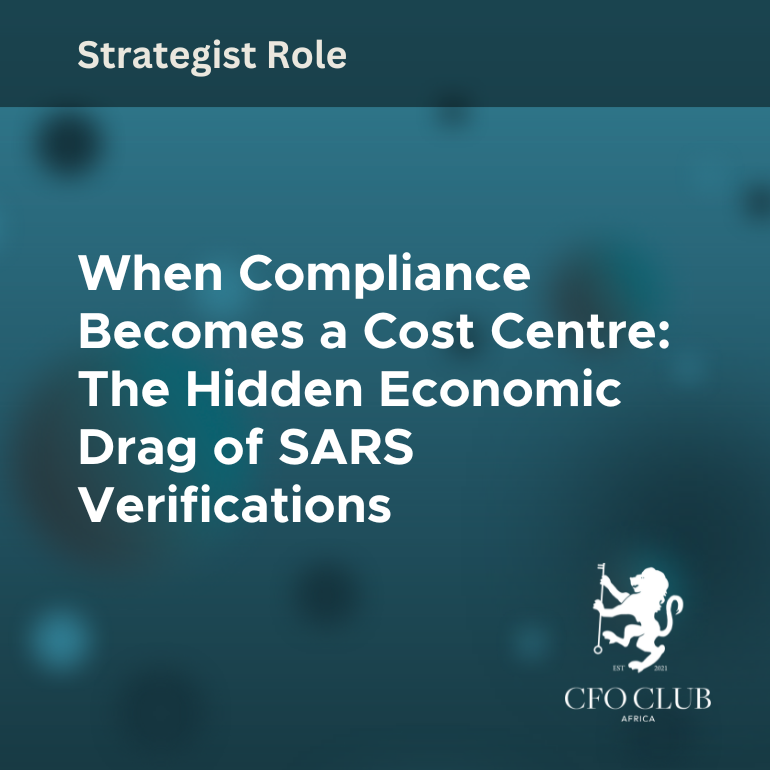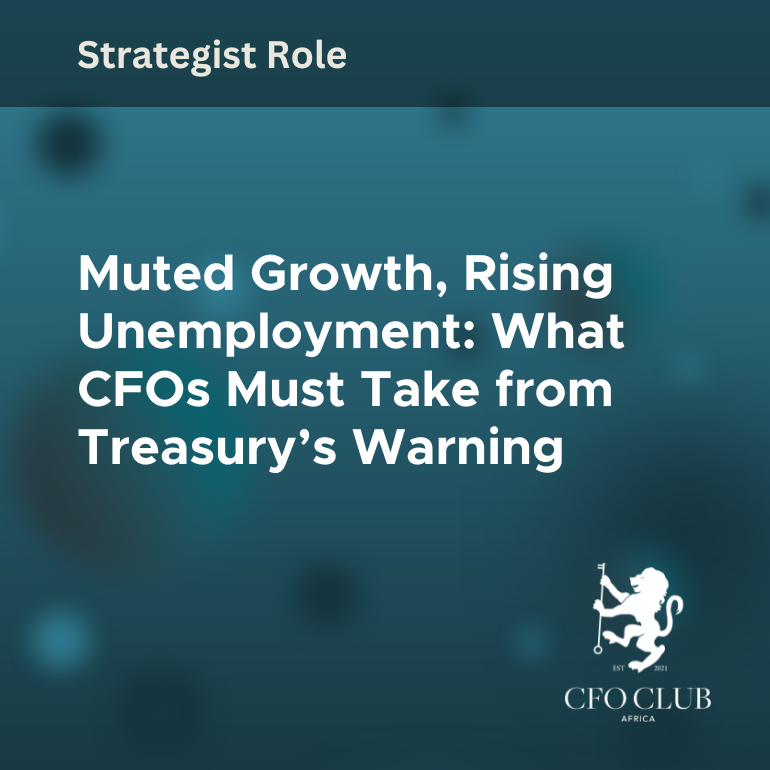When Compliance Becomes a Cost Centre: The Hidden Economic Drag of SARS Verifications
Inspired by “The Hidden Cost of SARS Verifications” by Nicolaas van Wyk, MBA, CEO of the Chartered Institute for Business Accountants (CIBA)
Every CFO knows the moment too well. You close off the tax year, complete reconciliations, file the return, and then it arrives: “Your return has been selected for verification.” What should be a simple check suddenly becomes a week of file searches, document uploads, and long explanations.
Nicolaas van Wyk, MBA, CEO of CIBA, recently unpacked what this actually costs South Africa. His analysis shows that SARS verifications, intended to be quick reviews, now absorb millions of productive hours every year. Around two million taxpayers spend roughly six hours each responding to verification requests. Half use tax practitioners, the other half lose work hours doing it themselves. The total bill? About R7 billion in direct costs and over R10 billion in total economic loss once productivity is factored in.
Compliance at the Expense of Production
For finance leaders, these numbers are not abstract. Many corporate finance teams spend significant time dealing with similar verification requests for VAT, PAYE, and provisional tax. These are not audits, yet the supporting evidence required often duplicates data that SARS already has. Each verification absorbs skilled hours that could have gone to forecasting, analysis, or managing risk.
In effect, compliance has become a cost centre. Instead of protecting value, it drains capacity. Teams that should be optimising capital allocation are forced to produce proof of payments that have already been reconciled.
The issue goes beyond irritation. It affects productivity, cash flow, and national efficiency. It raises the question: Are we building an economy where compliance consumes more energy than creation?
When Refunds Become an Interest-Free Loan
Van Wyk’s analysis highlights another consequence: cash flow distortion. For individuals and companies alike, taxes are paid upfront through PAYE and provisional tax. When legitimate deductions or refunds are due, the process should simply return overpaid funds. Yet SARS routinely holds these refunds while “verification” continues.
The result is an interest-free loan to the state. For CFOs, this creates liquidity risk and unpredictability. Refunds that should be available for operations or reinvestment are trapped in process queues. Treasury teams must hold higher buffers, delaying projects or supplier payments.
The cumulative impact is real. When billions are withheld across the private sector, liquidity shrinks, spending slows, and the productive economy carries the cost of administrative inefficiency.
Verification and Governance Risk
The expansion of verifications into areas already covered by third-party confirmations creates a governance problem. When SARS requests bank statements for payroll already verified through PAYE submissions, or re-checks medical aid contributions confirmed by the scheme, it is duplicating assurance work.
For CFOs, this means managing compliance uncertainty. Each request is treated as unique, with varying interpretation and inconsistent timelines. Finance teams face documentation overload and must manage the risk of missed responses or lost submissions.
From a governance standpoint, this is not just about tax. It is about the efficiency of public administration and its role in economic coordination. As the CIBA framework reminds us, government’s role is not to monopolise control but to ensure transparency and enable competition. Efficient governance is the true safeguard of trust.
Counting the Opportunity Cost
CIBA’s philosophy views accountants and financial leaders as nation-builders, not box-tickers. Every unnecessary verification pulls them away from that role. Van Wyk’s figures translate into about 13.2 million hours of lost productivity, the equivalent of 7 300 full-time professionals working an entire year on administrative compliance.
That is 7 300 skilled people who could have been driving innovation, mentoring teams, or building value. Instead, they are duplicating data already known to the state. This is not a tax issue; it is a national productivity issue.
The CFO’s Role in Redefining Efficiency
CFOs are in a position to lead change. You can measure, communicate, and advocate for smarter systems that reduce duplication and improve turnaround times.
1. Measure your verification impact.
Quantify the time, fees, and delays caused by SARS verifications. The data can strengthen the case for reform and make the hidden cost visible.
2. Buildverificationreadiness.
Keep all standard supporting documents digitised, reconciled, and easy to retrieve. Quick, consistent responses reduce frustration and show professionalism.
3. Engage through CIBA.
CIBA is the natural platform for collective advocacy on these issues. By working through one professional voice, members can help shape practical solutions and promote smarter digital compliance models.
4. Remember that time is also a tax.
Every redundant verification is an invisible tax on productivity. Efficiency in administration is not a luxury; it is an essential ingredient of economic growth.
A Smarter Future
CIBA’s policy vision is simple: lean, accountable governance that supports enterprise and innovation. SARS has achieved significant success in digital transformation, but the next step must be efficiency with empathy. The system must recognise that every minute of unnecessary compliance work represents a cost to the economy.
As Nicolaas van Wyk said, “Compliance should protect the fiscus without punishing productivity.” This is not about avoiding verification. It is about restoring balance between oversight and efficiency.
For CFOs, this is a leadership opportunity. By quantifying and communicating the hidden cost of inefficiency, you become a voice for reform, not just for your company, but for South Africa’s economic performance. The goal is not less accountability, but smarter accountability.
When compliance supports productivity, growth follows. And that is the kind of nation-building CIBA stands for: a South Africa where financial leaders create value, not just verify it.





